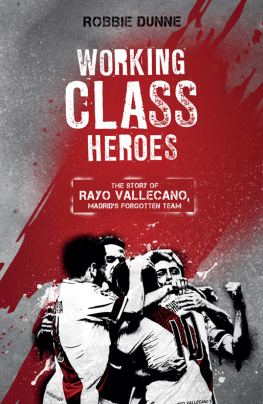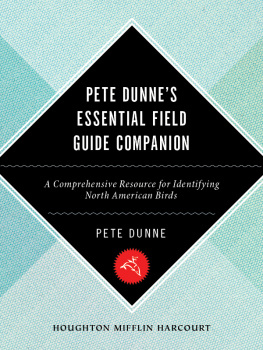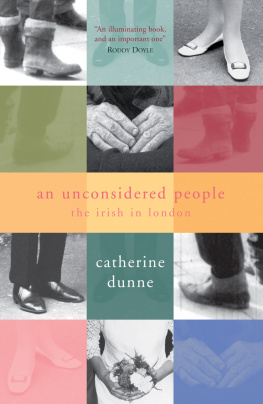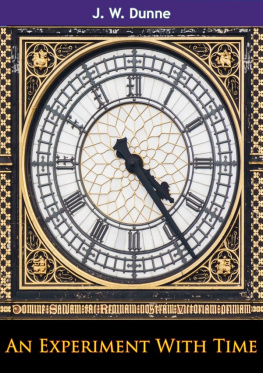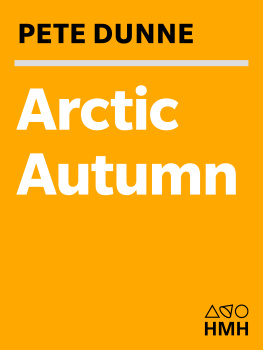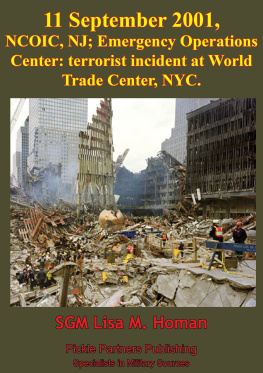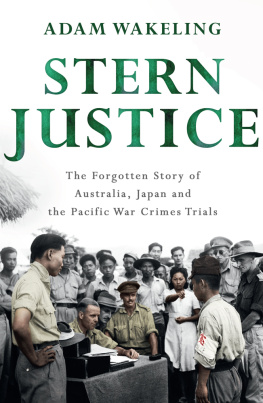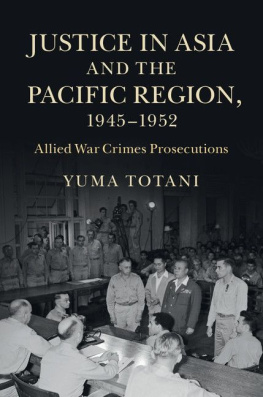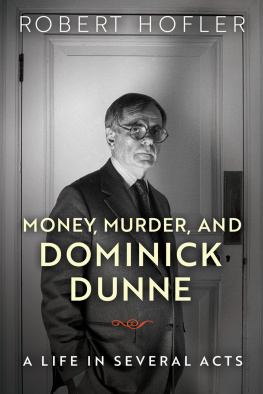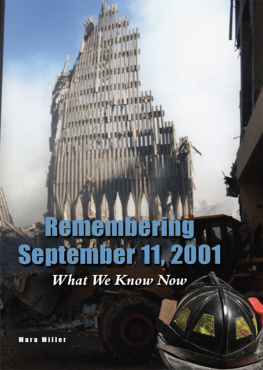Dunne - Justice: crimes, trials, and punishments
Here you can read online Dunne - Justice: crimes, trials, and punishments full text of the book (entire story) in english for free. Download pdf and epub, get meaning, cover and reviews about this ebook. City: New York;United States, year: 2002;2009, publisher: Crown;Archetype;Crown Publishing Group, genre: Detective and thriller. Description of the work, (preface) as well as reviews are available. Best literature library LitArk.com created for fans of good reading and offers a wide selection of genres:
Romance novel
Science fiction
Adventure
Detective
Science
History
Home and family
Prose
Art
Politics
Computer
Non-fiction
Religion
Business
Children
Humor
Choose a favorite category and find really read worthwhile books. Enjoy immersion in the world of imagination, feel the emotions of the characters or learn something new for yourself, make an fascinating discovery.

- Book:Justice: crimes, trials, and punishments
- Author:
- Publisher:Crown;Archetype;Crown Publishing Group
- Genre:
- Year:2002;2009
- City:New York;United States
- Rating:3 / 5
- Favourites:Add to favourites
- Your mark:
- 60
- 1
- 2
- 3
- 4
- 5
Justice: crimes, trials, and punishments: summary, description and annotation
We offer to read an annotation, description, summary or preface (depends on what the author of the book "Justice: crimes, trials, and punishments" wrote himself). If you haven't found the necessary information about the book — write in the comments, we will try to find it.
Justice: crimes, trials, and punishments — read online for free the complete book (whole text) full work
Below is the text of the book, divided by pages. System saving the place of the last page read, allows you to conveniently read the book "Justice: crimes, trials, and punishments" online for free, without having to search again every time where you left off. Put a bookmark, and you can go to the page where you finished reading at any time.
Font size:
Interval:
Bookmark:
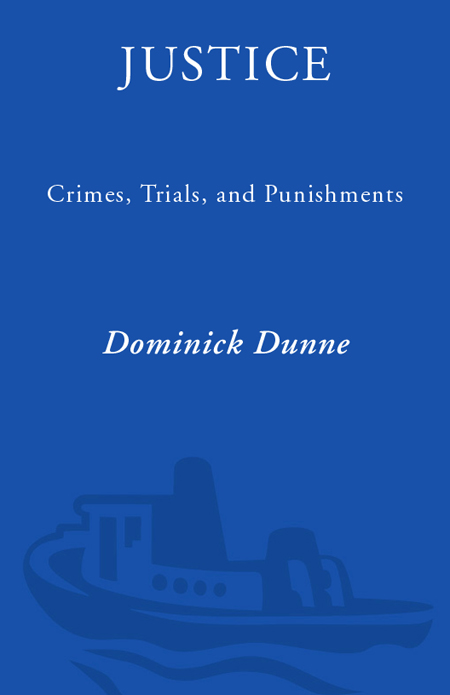
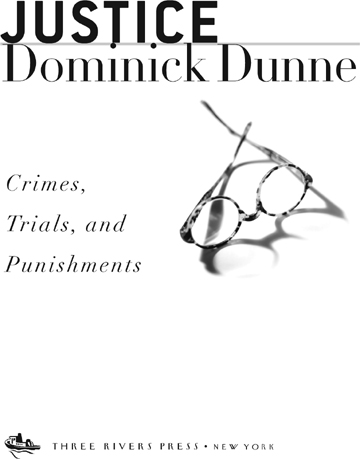
For my two great editors,
BETTY A. PRASHKER
of Crown,
who has guided me through my books, and
WAYNE LAWSON
of Vanity Fair,
who has guided me through every article,
with love and thanks
NONFICTION
The Way We Lived Then
Fatal Charms
The Mansions of Limbo
FICTION
Another City, Not My Own
An Inconvenient Woman
People Like Us
A Season in Purgatory
The Two Mrs. Grenvilles
The Winners


I DIDN'T START WRITING until I was fifty years old although an observer's eye had been observing for forty of those fifty years, while trying out different areas of occupation. My career in television and movies in Hollywood had come to a permanent halt, and I had nowhere else to turn. The thought of writing had been lurking within me for some time, but I didn't actually begin until I finally removed myself from the glamorous world in which I no longer belonged to a one-room cabin in the Cascade Mountains of Oregon. There I began my second career as a writer and a recorder of the social history of the time. The plot of that first book had been played out in front of me the year before I left Hollywood. The gossip of the set in which I had once moved centered around the head of Columbia Studios, David Begelman, who, rumor had it, had forged a check for ten thousand dollars in the name of Cliff Robertson, an Academy Awardwinning actor. Barely a word of the scandal appeared in the Los Angeles papers. Powerful people saw to that. The wagons closed in to protect one of their own. I was watching it firsthand as it was happening. I became obsessed with the story. As I was out of work, I had plenty of time to feed my obsession, and I gossiped about it nonstop on the telephone, trying to get the story into wider circulation. I knew all the players in it, and their wives, agents, secretaries, and mistresses.
By sheer happenstance, in the sort of coincidental meeting that is a signature of my life, a man I did not know recognized me in the Polo Lounge of the Beverly Hills Hotel. I was there having lunch with my agent, who was telling me I was all washed up, which I already knew. I was not remotely famous, so it was not that sort of recognition. It developed that one of my brothers had been in this man's class at Georgetown, and he recognized the family resemblance. He turned out to be a reporter from the Washington Post, and what he had been sent out to cover was the long-suppressed forgery story that was so gripping to me. He told me that the actress Dina Merrill, the then wife of Cliff Robertson, had gone to Kay Graham, then publisher of the Washington Post, and said that a cover-up of the forgery was going on. Mrs. Graham sent out the reporter and a partner to check out the story. But no one would talk to them. Secretaries would not put through their calls. Doors would not open for him. They had not been able to gather anything of consequence to bear out Dina Merrill's version of the story. The enormity of the coincidence that this reporter and I should meet ultimately turned out to be a life-changing experience for me. I was like manna from heaven for him, and he was the release I needed for the story that was bursting inside of me to be made known. The Begelman story was the epitome of everything I had grown to hate about Hollywood. In all honesty, there was also a bit of revenge in my motive, because of my failure there. I knew a great deal of the information the reporter was seeking and I willingly shared it, including all the unlisted telephone numbers he needed. I spent a week with him and his partner, driving around with them, watching two investigative reporters research and then put together a story. It was they who broke the story nationally. It was thrilling for me to know that I had played a part in it. I felt a kind of excitement within myself that I hadn't felt about the movie industry for a long time. I could do what these guys are doing, I thought to myself. It took a while, but that's what happened, and that's what this book is: a collection of stories about the cases and trials that I have covered for Vanity Fair magazine. Incidentally, the studio head who forged the check only had to attend a few sessions with a psychologist popular in the Hollywood community as punishment for his theft. He then became the head of MGM and continued to be invited to parties and to give Sunday-night screenings in the projection room at his house of all the latest films for all the best people. On the other hand, the Academy Awardwinning actor whose name he forged never got a role of any consequence in Hollywood again. Years later, Begelman shot himself to death in a room at the Century Plaza Towers. His widow sent me a straw hat of his that I once admired.
A tragic event in my personal life changed me forever. In 1982, my only daughter, Dominique, was murdered by a former boyfriend, John Sweeney, who stalked her and strangled her. I had never attended a trial until that of the man who murdered my daughter. In fact, I had been a feather in the breeze until that cataclysmic eventhere, there, everywhere, never sure of who I was or what I was supposed to be. What I witnessed in that courtroom enraged me and redirected me. The lies that are tolerated shocked me, as did the show-business aspect that has taken over the justice system. My daughter's killer was costumed like a sacristan in a Catholic seminary. For a prop, he carried a Bible, which he read throughout the trial in a pious fashion. He was presented as a blue-collar boy who had fallen in love with a Beverly Hills society girl. How I hated his lawyer. I learned in that courtroom that the rights of the victim do not equate with the rights of the defendant. Anything can be said about the dead, and much was, but the killer's grave past offenses as a beater of women were kept from the jury. The testimony of another of his victims, who had been hospitalized as a result of his acts of violence, was, inexplicably, ruled inadmissable. The trial was a travesty. There has been a television documentary about it. The judge had a personal animosity toward the prosecutor. How I hated that judge. The jury fell for the Bible-reading act, and John Sweeney, who has subsequently changed his name, received a sentence of six years, which was automatically reduced to three. He was released from prison after two and a half. How I hated him, even as I knew that hate is not a state in which to linger. My rage needed a release from the persistent plan in my mind to hire someone to kill him, an obsession I had for months, which is not an uncommon reaction for the parent of a murdered child. But, unlike the killer, I would have ended up in prison for life. Instead, I wrote about the murdernot just about the facts of the story but about the emotional upheaval and permanent scars my wife, my sons, and I suffered during that terrible period. The first magazine article I ever wrote is the story of that trial. It appeared in Vanity Fair in March 1984. The affirmative reaction to the article, titled Justice, made me realize the power of the written word. It was read in some law schools to show just how badly a trial could go. I was proud of that. For the first time in my life, I felt that I was in step with my destiny. I became fascinated by trials. I attended a great many of the high profile trials of the last decade and a half, including the senatorial impeachment trial of President Clinton. I became repelled by the kind of defense attorney who would do anythinganythingto win an acquittal for a guilty person. They're just doing their job, Dominick, other reporters would say to me, but I could never bring myself around to that way of thinking.
Font size:
Interval:
Bookmark:
Similar books «Justice: crimes, trials, and punishments»
Look at similar books to Justice: crimes, trials, and punishments. We have selected literature similar in name and meaning in the hope of providing readers with more options to find new, interesting, not yet read works.
Discussion, reviews of the book Justice: crimes, trials, and punishments and just readers' own opinions. Leave your comments, write what you think about the work, its meaning or the main characters. Specify what exactly you liked and what you didn't like, and why you think so.


